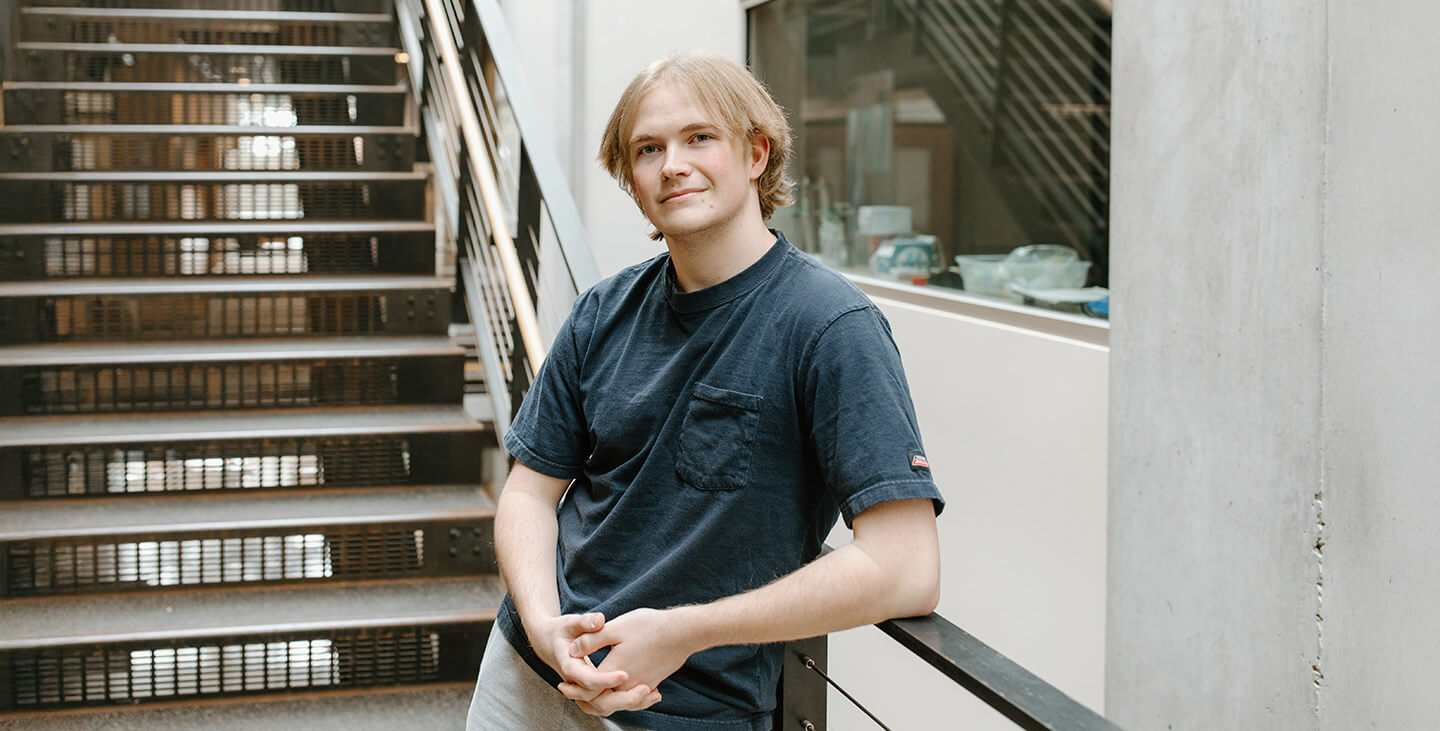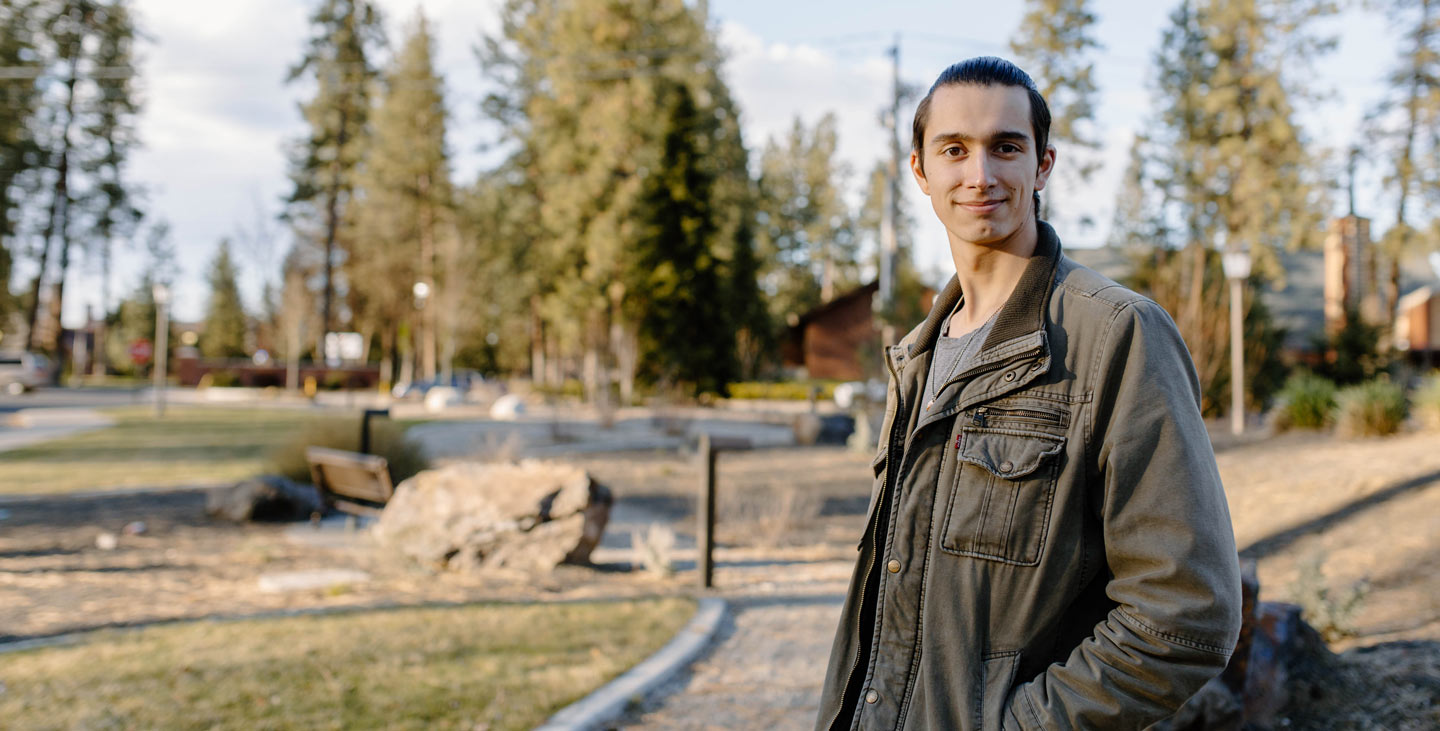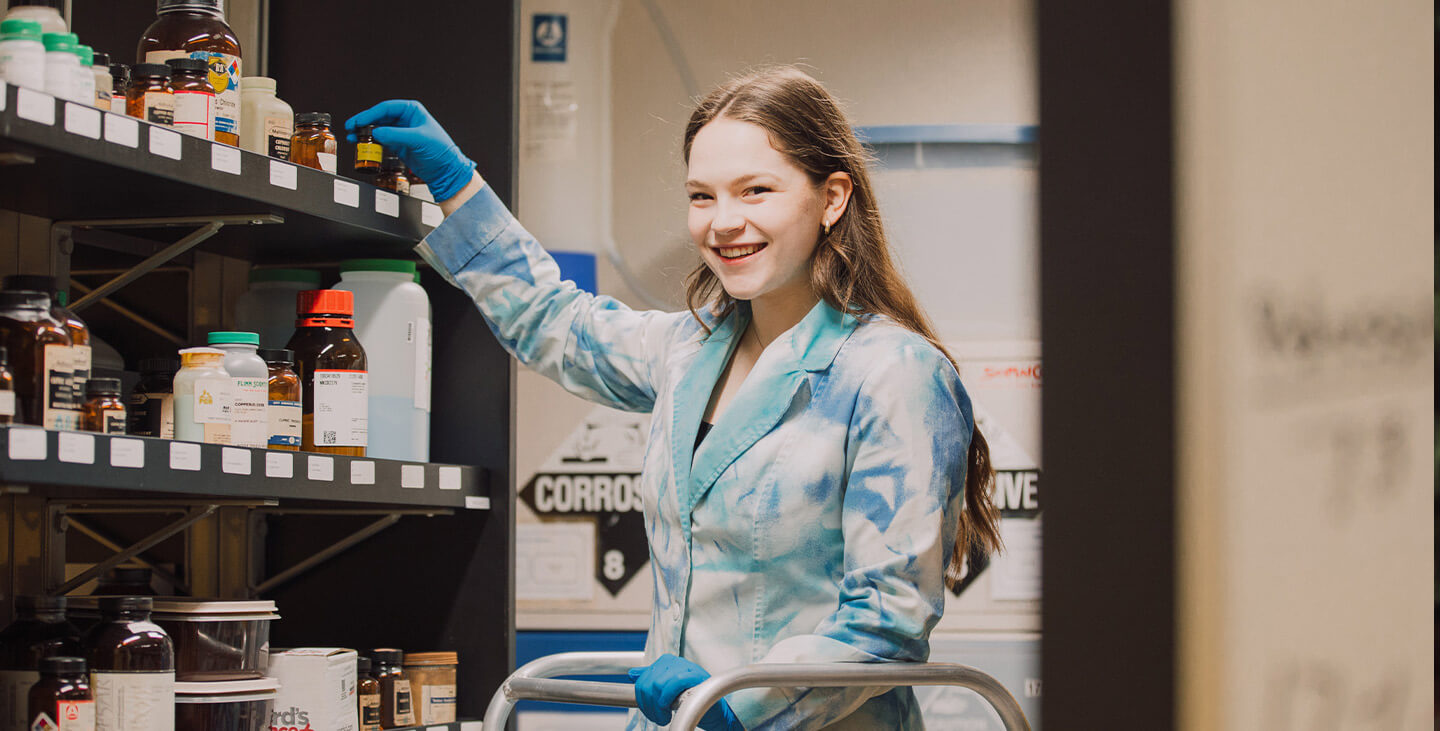Chemistry

Jackson Kottman '26
Why did you decide to study chemistry?
Science has always been my strongest subject, and I've always quite enjoyed it! Ever since my freshman year of high school, where I had my favorite teacher of all time, chemistry has always been my go-to. The fundamentals of life via chemicals and the science behind it all is so incredibly fascinating. The ways our world works in unison and how things are composed will never get old to me.
What classes have been your favorite so far?
The Organic Chemistry series and Biochemistry have been my favorite classes so far. Organic Chemistry explains so much about our world, and Biochemistry blends it all together with human nature. Other than these two subjects, I'd put a gold star on Intro to Philosophy. If you want to become a more developed person with sophisticated thoughts, take that class for sure.
Tell us about a unique experience you've had or project you've worked on for your major.
A unique experience I've had so far was a project for my Organic Chemistry lab. I had to give a 15-minute presentation on a chemical that I had created. It was difficult, and I've never been good at public speaking, but I believe that it was extremely valuable to my learning. It felt similar to how you might present some research findings in a real-life scenario.
What advice would you give to someone thinking about majoring in chemistry?
I would tell someone thinking about majoring in science that it's amazing but tough. Science is so vast and expansive. There's so much to learn. For the inquisitive, this is amazing! However, with great power comes great responsibility, and it takes some tough skin to fail and get back up again.
What's your dream job?
I'm aspiring to be an orthopedic surgeon! I'm currently pre-med and doing my best to achieve my dream. I think anything that's chemistry- or biology-related is great for going into medical school.
Who are three people who have made a difference for you at Whitworth?
Professor of Chemistry Kraig Wheeler: Dr. Wheeler is an amazing resource for chemistry here at Whitworth. Kind and insanely smart, he knows everything under the sun about organic chemistry.
Professor of Chemistry Deanna Ojennus: Dr. Ojennus is another insanely smart resource here at Whitworth. She teaches anything biochemistry-related and is a great person to go to for pre-meds!
Instructor of Philosophy Rebecca Korf: Dr. Korf's Introduction to Philosophy class was life-changing for me. Her kindness and classes are a wonder to attend.
Why did you choose to attend Whitworth?
I chose to attend Whitworth because I wanted a university that was a little far away from my home. I wanted to expand out and be my own person. I'm from the Seattle area, and this puts Spokane about five hours away, which is perfect. I'm far enough away from home to be independent, but close enough to still have family to rely on. It really is my dream situation. Alongside the amazing professors, small class environments and much more, there is a ton to enjoy at Whitworth.
Stephanie Ryder '24
Why did you decide to study chemistry?
I loved my introduction to the subject in high school and decided on the major because I was initially interested in attending medical school. As my initial interest in the subject grew through lecture and laboratory experience, I realized there was so much more to the subject than I ever expected and fell in love with chemistry.
What classes have been your favorite so far?
During the 2023 Jan Term, I took the Biochemistry of DNA and RNA course with Dr. Deanna Dahlke Ojennus. I loved learning about Rosalind Franklin and the history of the discovery of DNA alongside the biochemical topics. The lecturing style provided a lot of historical contexts that we normally wouldn't have time to cover and made for an exciting course that was captivating in so many ways.
Tell us about a unique experience or project you've worked on for your major.
An incredibly unique experience I was able to have during my time at Whitworth was completing two summers of research in the lab of Dr. Deanna Dahlke Ojennus. I studied a calcium-binding motif in the enzyme Prolyl aminodipeptidase from Lactobacillus helveticus and in turn realized how much I enjoy the research process. Then as a part of my research and dissemination course between the two summers, I wrote up my findings using what I learned in my writing intensive and chemical literature courses. After editing the paper to include the new findings, my advisor and I were able to publish it in the American Chemical Society's journal Omega. It was a full circle moment where I felt like I was able to fully utilize what I had learned through my degree.
What advice would you give to someone thinking about majoring in chemistry?
The biggest piece of advice I would give to someone interested in majoring in chemistry is that there are more opportunities and applications with the subject than you would ever expect. Be open to possibilities and opportunities, and try new things. It was maintaining the eyewashes that got me into helping with the NMR instrument, being a laboratory assistant and working in the stockroom. I also never realized the vast career prospects offered by a chemistry degree and the variety of chemistry concentrations.
What's your dream job?
Right now, I am very interested in the intersections of biochemistry and its applications to immunology and medicine. I am not fully sure what my dream job is, but I think it would be amazing to work at a research or academic institution doing research.
Who has made a difference for you at Whitworth?
Dr. Deanna Dahlke Ojennus and Dr. Karen Stevens have been amazing professors and advisors. Traveling across Europe with Dr. Stevens and doing research with Dr. Ojennus were formative experiences through which I recognized my love of chemistry. Additionally, the stockroom staff (Lyvie, Julie, Sarah and fellow student workers) have taught me many skills as well as been incredibly supportive through my time as an Organic Chemistry Lab TA and stockroom worker.
What is something that has surprised you about your major?
Something that surprised me about my major was that there was study abroad available for chemistry and non-chemistry majors every few May Terms. The History of Chemistry & Art in Europe with Dr. Karen Stevens was amazing as we traveled through the United Kingdom, France, Germany and Austria in May 2022 learning about how chemistry impacted art as well as the history of chemistry and art. One of my favorite things from the trip was visiting the Curie Institute in Paris, France, as well as sliding through the salt mines outside of Salzburg, Austria.
 Raichel Portis '22
Raichel Portis '22
Why did you decide to study chemistry?
I decided to study chemistry because it was my favorite subject in high school. Studying it for the past three years has taught me how to be objective and become better at reasoning and solving problems in the real world.
Tell us about a unique experience you've had or project you've worked on for your major.
I will be doing research this spring semester, so that will most likely be the most unique project for my major. My unique experience overall was signing my Army contract in 2020 to serve as an Army officer after graduation due to Whitworth and Gonzaga University's ROTC program.
What advice would you give to someone thinking about majoring in chemistry?
When choosing to be a chemistry major, you need to be OK with getting frustrated but know how to bounce back and ask questions! That being said, the major itself is difficult – I won't lie – but if it was easy wouldn't everybody choose it? Learning from your mistakes in chemistry is crucial. Also understand that your professors are there to help you succeed. Professors assign challenging work to help you grow proficient.
What's your dream job?
My dream job is to be working in healthcare. I have not established a specific job in healthcare; it's been changing as I discover options in the field.
Who has been an important connection for you at Whitworth, and why?
My advisor, Dr. Trisha Russell, has been my most important connection here at Whitworth in regards to my major. She has helped me build my four-year plan and rearrange it multiple times to best fit my needs and schedule. In regards to my career choice, Dr. Ojennus and Dr. Stevens are two important women who have given me the best advice possible.
Why did you choose to attend Whitworth?
I chose to complete my undergraduate studies at Whitworth because I liked its premed and chemistry programs. After my first year on campus, I admired the loving neighborhood atmosphere that Whitworth provided. I also made some lifetime friends while studying here. Also there are many things to do and explore in Spokane. For example, during the fall, I definitely recommend going to the Green Bluff farms! During the spring, I recommend going on hikes/nature walks through Bowl and Pitcher. Whitworth and Spokane in general have become my home away from home.
 Sam Cuentas '22
Sam Cuentas '22
Why did you decide to study chemistry?
I originally started my undergraduate studies at Whitworth University as a biology major, much like many other pre-med students. However, since my early youth I have had an interest in chemistry. I would enjoy my “Slimy Chemistry” play set as a child, and when high school chemistry and then General Chemistry came and went, I found I actually had a knack for it. Where others claimed to struggle with the concepts, I excelled and would often spend free time studying more advanced chemical concepts just out of interest. During my freshman year, I looked at the courses ahead of me in my program, and I quickly learned that the classes I wanted to take aligned more with the biochemistry track. This initially concerned me, as I had heard this was a very difficult field. Pursuing medicine, however, has made me ready for the challenge, and I am excited to keep learning about the microscale intricacies of God's creation!
What are some of your favorite classes so far?
Honestly, Organic Chemistry takes the cake. It was always talked about by other pre-med folks as being one of their hardest (if not the hardest) classes. I will not discount the challenge of the course by any means, but personally I found my fascination with the content and enjoyment of the material to far outweigh the difficulty of the workload. I love puzzles, and most of the content in Organic is just that: a puzzle. It is not necessarily hard to grasp or conceptually challenging, but rather an application of problem-solving and critical thinking. This pushing of my abilities in these areas was quite fun for me, and I consider the way I learned to think through problems as valuable, especially with my consideration of a surgical career. I have also never been better at drawing a thousand hexagons!
Tell us about a unique experience you've had or project you've worked on for your major.
As intimidating as it was at first, I really enjoyed the synthesis project from Organic Chemistry II. Every student was given a different drug or medicine, and we had to create a synthesis starting basically from scratch. In my case, I was assigned Lexapro (Escitalopram, a common antidepressant) starting from just the most basic materials like propane and a few other small compounds. The thing is, we were not allowed to work on it with other students or use any resources other than our notes and the textbook. This forced me to really think through everything that I had learned up to that point and apply it to the extent of my ability. It took a while, but it was quite satisfying to complete.
What advice would you give to someone thinking about majoring in chemistry?
I won't sugarcoat it. Learn to manage your time. Science is hard, and it requires good work ethic and self-discipline. It is highly worth the effort, though, and the skills you acquire as you become a true investigator and critical thinker are invaluable and will serve you well in any career path. If you are up for the challenge, go for it!
What's your dream job?
I have had my eyes on orthopedic surgery for some time now, and the further along I get, the more I am confident that I have chosen a good direction for myself. Even if I do not end up pursuing that specific specialty, I have been set for years on doing surgery in some capacity. God has given me the heart of a healer, and I know without a doubt that if he plants a passion in me, he will also provide the means to accomplish it.
Who has been an important connection for you at Whitworth, and why?
My advisor, Dr. Karen Stevens, has been a huge blessing for me here. I remember attending a General Chemistry II lecture when I visited Whitworth for the first time as a sophomore in high school, and we connected over a Norwegian food of all things. As a junior at another visit event, I ended up attending another one of her classes. She is very personable and approachable, and I would highly recommend her not only as an advisor and mentor, but as a friend. She has taken the time to help me navigate all the questions of college and my direction as a future clinician, and much of her guidance has been from the sharing of her personal experiences.
What's something that surprised you or might surprise other students about your major?
I hear constantly about "how impressive it is" that I'm studying biochemistry or that I'm somehow a genius because of it. In my time helping fellow students or people in classes I've already taken, though, I have found that usually the most prominent obstacle hindering people from performing well in this field is their mindset and perspective. Too many people set themselves up for failure by claiming they are “not smart” or they just inherently "aren't good at science." Stop it! There isn't some magic spell or special gene that will somehow make you instantly understand all the mysteries of the natural world. Dedication and work ethic are the keys.
All this to say, I was surprised at how understandable this field is. Don't get me wrong, it is a lot of work and one must spend significant time to fully understand everything, but it isn't impossible. Looking back, no one concept was altogether mind-blowing. Everything has been straightforward and just builds on prior concepts. I can vouch for the validity of instructor recommendations for studying. When I have taken ample notes, spent extra hours studying in addition to homework, and been sure to ask questions when I don't understand something, I have ended up understanding the material and getting a good grade. Honestly, I think the hardest part about this field is the quantity of information, not the supposed impossibility of all the concepts.
Why did you choose to attend Whitworth?
I am going into a competitive and difficult field, and I knew before I even started considering schools that I would need to set myself up for success as much as possible. Plenty of universities have programs for the sciences I would need under my belt, and lots of institutions boast about their pre-med program. However, few can confidently claim a 100 percent medical school acceptance rate for those who complete all the recommendations from Whitworth's pre-med program. This is all but unheard of, especially considering the national average for medical school acceptance is significantly lower.
Strong academics was not the only thing that drew me here. The small class sizes and personable accessibility of professors are perks that are difficult to find at larger universities. Where else will professors invite classes to their homes for dinner, or know every student in the class by name? Certainly not somewhere where the average class size is hundreds of people. This is a huge advantage as a student – having professors genuinely interested in who we are as students and caring about our individual success. They take time to get to know us and do whatever they can to make sure we strive to be the best that we can be. When current students tell prospective students about how great the professors are here, they do not lie. I thought it was exaggerated when I was considering Whitworth, since every school is going to flex about how they were the best. Whitworth delivered when it came to my expectations in this area.
